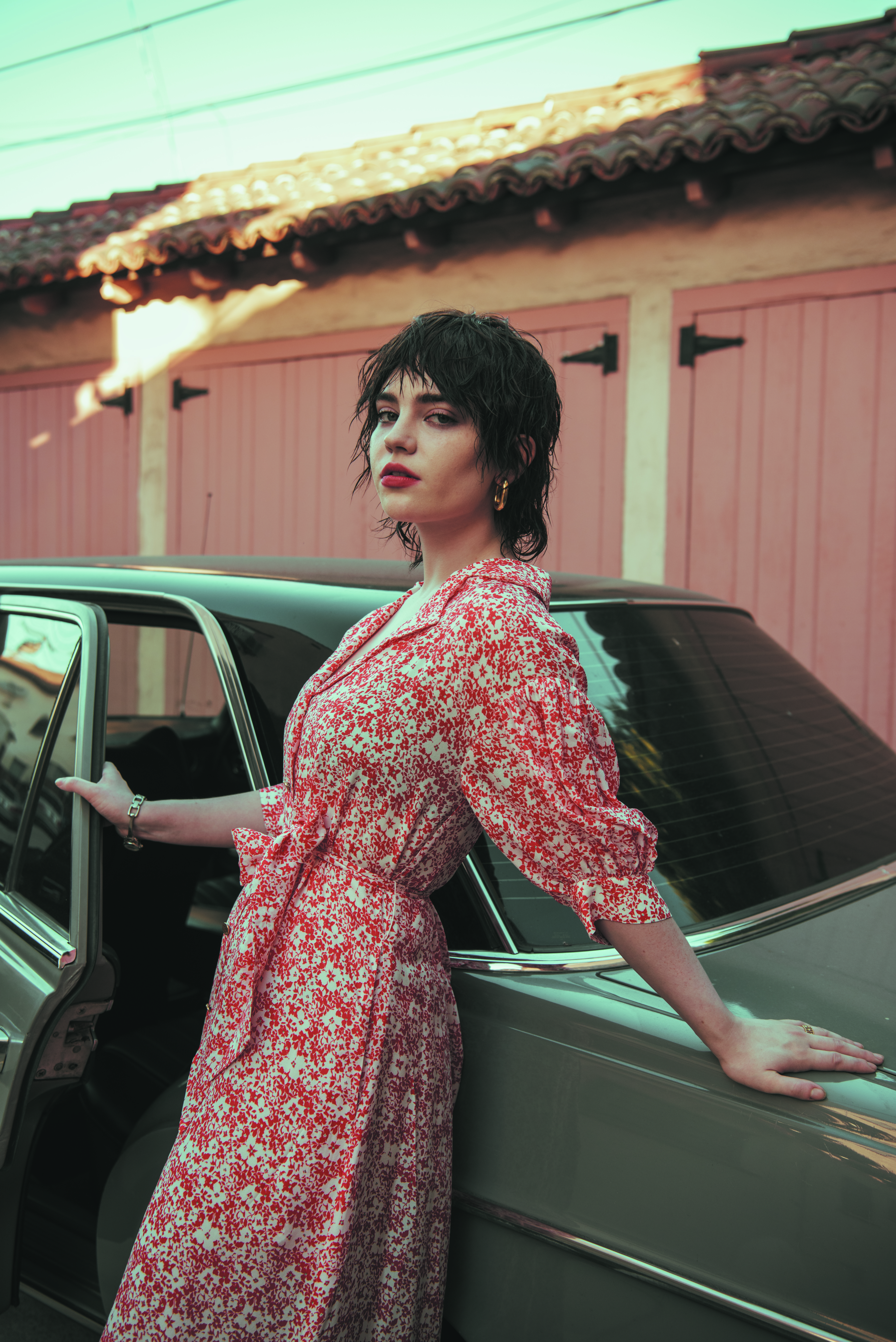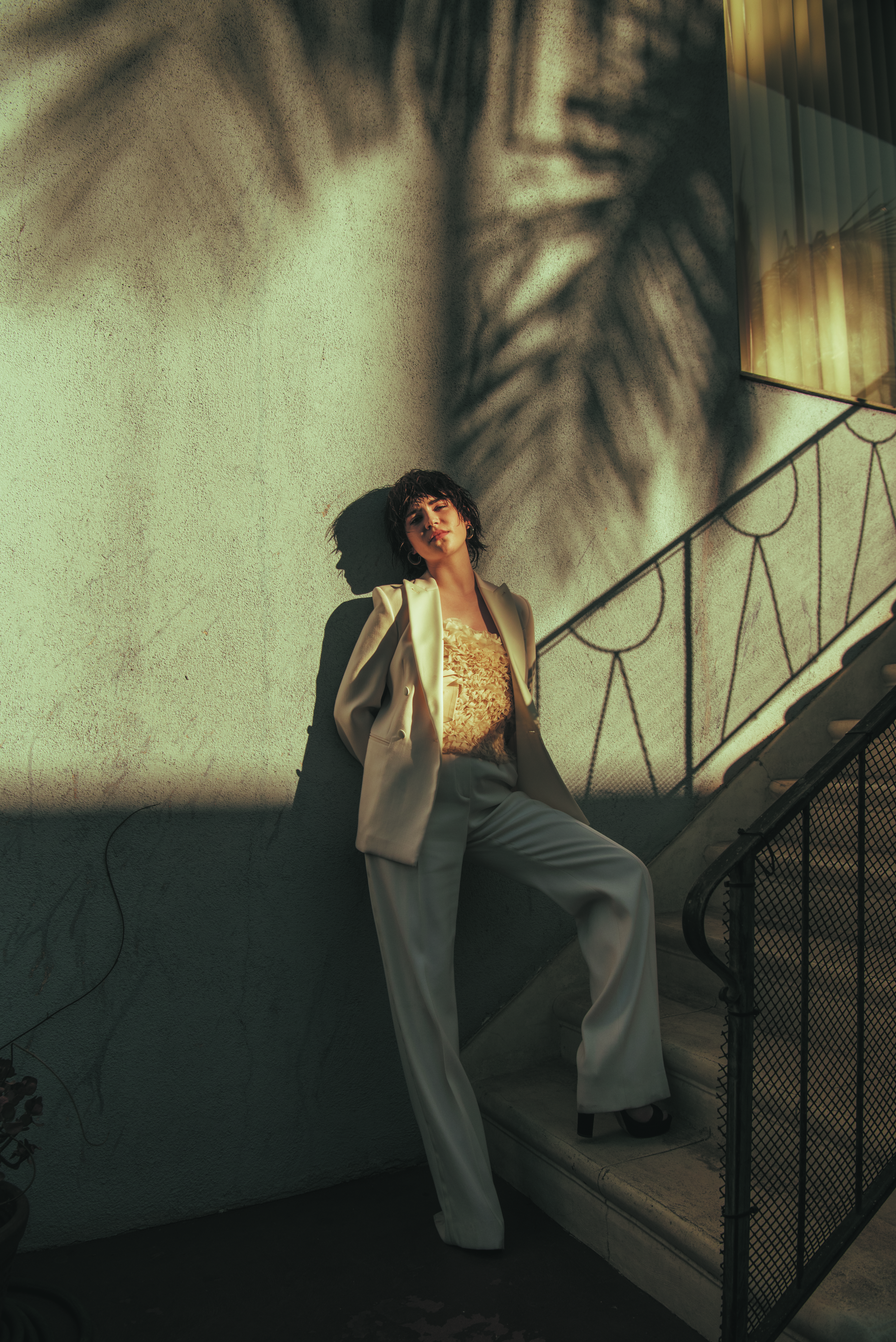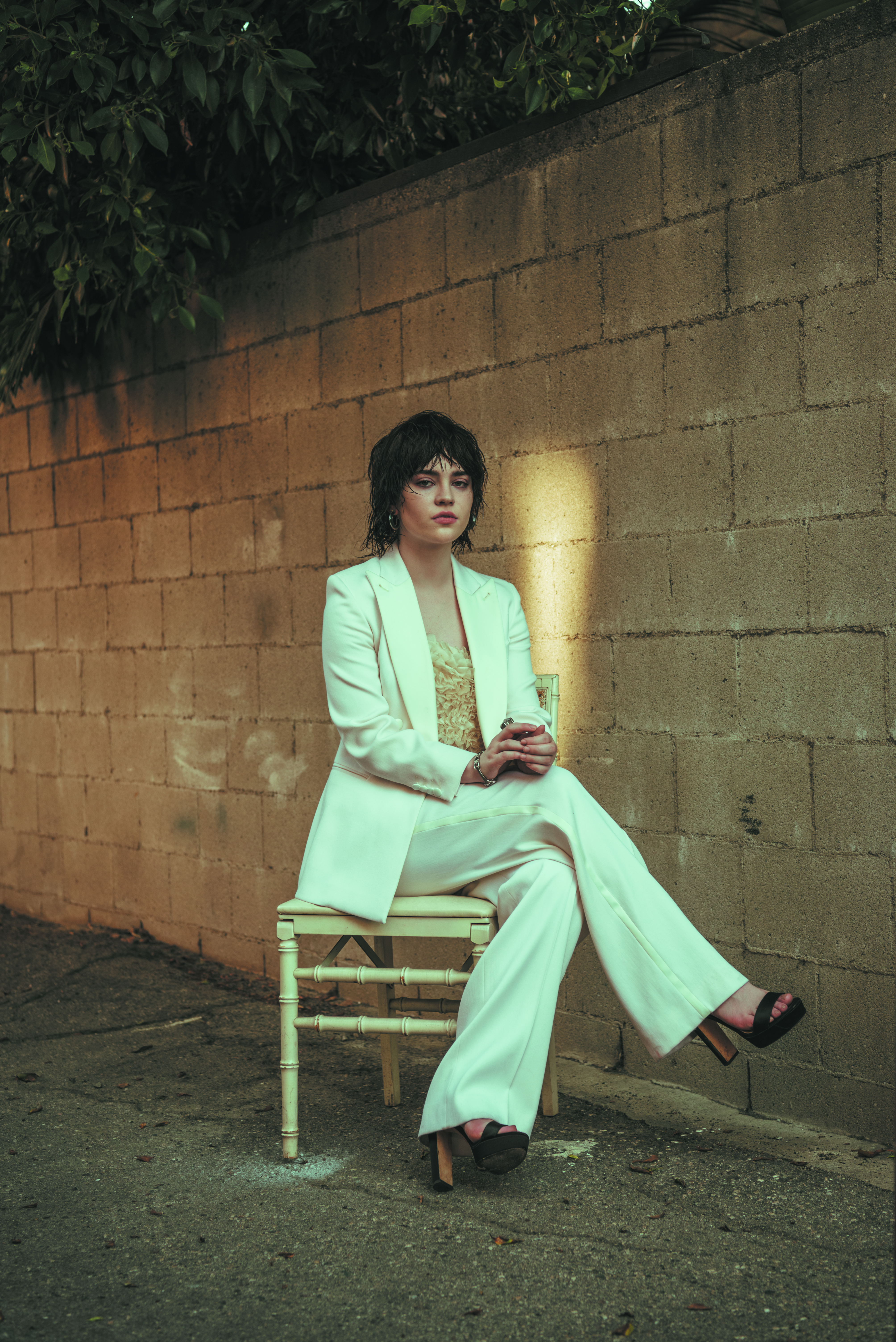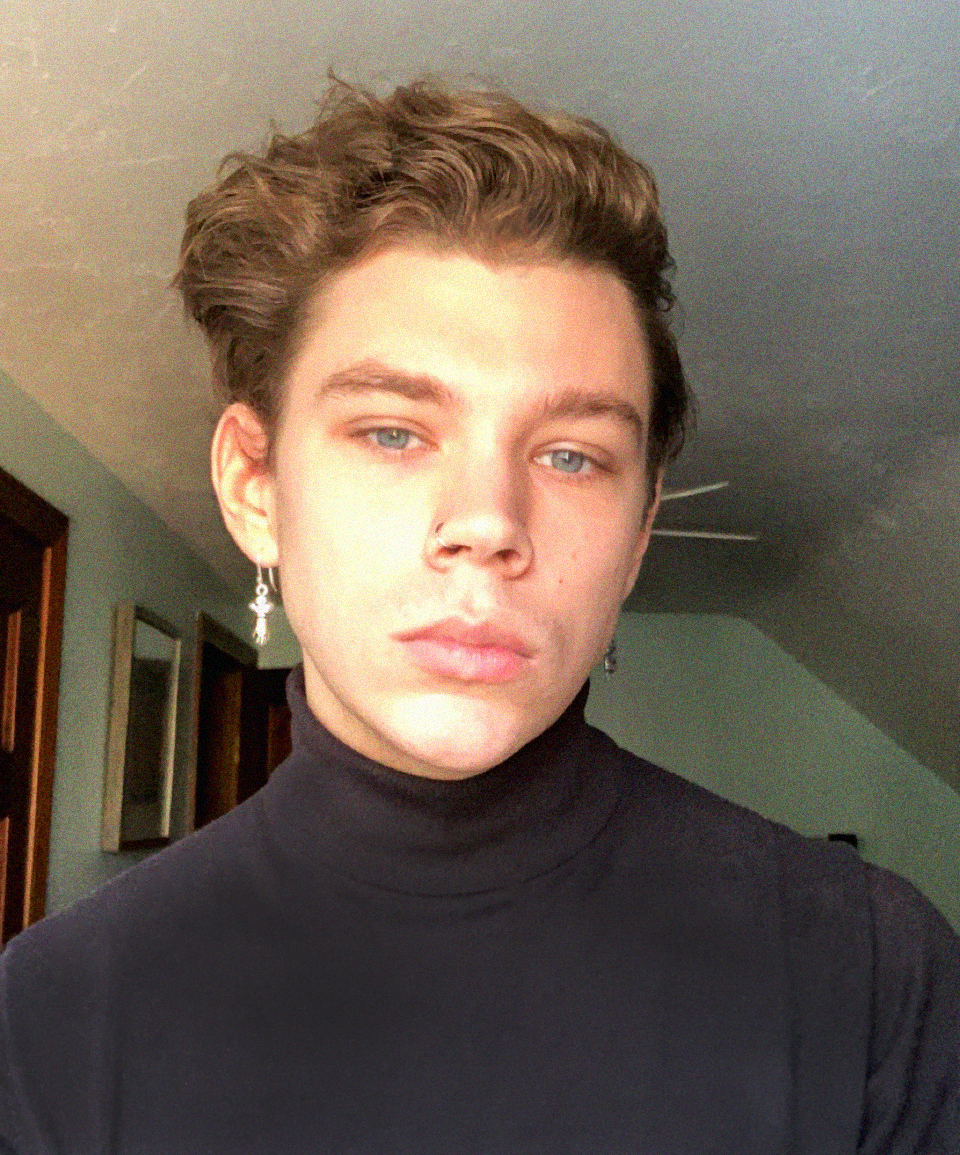

Ever since Lord of the Flies was first published in 1954, the narrative trope of children lost in the wilderness and turning to conflict has been a tale told many times over. But with a fresh and exciting take on the genre, Yellowjackets, which premiered on November 14 of this year, promised to spin the cliché on its head. Part of what made that happen was due to the talent, edge, and a Rolodex of references that 21-year-old Sophie Thatcher brought with her to set while playing the punk-rock spirited Natalie.
“I know everyone says, ‘it felt like working with family,’ Thatcher said, laughing. “But this truly felt like working with family.”
Thatcher is no stranger to the spotlight. With a background in musical theatre, she has always been a multihyphenate talent.
“I grew up singing, it was my big thing growing up. I’m classically trained, started with musical theatre but then kind of gave up on it,” Thatcher said. “Music is my number one without a doubt.”
When Thatcher had downtime, or what she calls “off weeks” while filming Yellowjackets forabout five months an hour outside of Vancouver in the Canadian wilderness, she would try and keep busy by returning to other artistic practices.
“I would try and spend a lot of time working on music, making art, and trying to stay productive. It was hard,” Thatcher said. “I paint a little bit too, I do collages, I draw a lot. My twin is the big artist, and we went our own separate routes, which was actually really important for both of us.”
She reminisced on about how she initially gave up painting for years, but eventually went on to start her practice again.
“I brought [painting] back up, and I started making art again. I said, ‘It doesn’t have to be [my twin’s] thing, I should do it too,’” she said with a laugh, as one does when joking around with a sibling. “It’s nice to have that outside of acting too, so I don’t put too much pressure on it, that would be a lot.”
Now that the show has finished filming, she’s putting even more emphasis on this part of her creative life. This was Thatcher’s way of keeping herself on the track of productivity, even after the advent of filming a physically intensive show.
“I’m trying to get out of the mindset of [Yellowjackets] and move on with stuff and stay productive. I needed to start working on music again, I have a couple synths, I just released stuff on Bandcamp, my twin makes music too. I have a lot of musician friends; I write with them.”
But when talking about this, there comes an important discussion that follows: What is the importance of art for career’s sake versus the importance of art for art’s sake? Where do we draw the line in a world that so often judges the importance of creative outlets on the basis of an income-based career?
Thatcher considered for a second what she thinks about her artistic practice outside of acting, and her main takeaway? Make something you don’t get paid for.

“There’s so much more freedom and not as much pressure, I can actually do it for myself without showing anyone. A lot of the time I make something and just keep it to myself,” Thatcher said. “It’s purely selfish, but it’s really nice, there’s a very different feeling to it, and I think everyone needs that.”
The feelings that come from this are almost cathartic. Making art to show the public most always has a pressure to be “good” in some subjective sense of the word, but Thatcher denies this mindset when it comes to her personal practice.
“Express what you feel, even if it’s not good and you’re not happy with it, you don’t have to share it,” she said. “That’s something that I’m trying to teach myself too.”
This led us down the path of everyone’s favorite topic: social media. Whether you love it for its positives, hate it for its faults, or sit somewhere in between, social media has become a sort of inescapable force that has an impact on almost every facet of modern-day life.
Thatcher feels the weight of social media, as we all do. There’s a sort of pressure to be visible and accessible constantly, as if we’re carrying around everyone else’s life in our pockets at all times, which, let’s be honest, we basically are.
“With Instagram and social media, I’ve naturally felt inclined to always want to share what I’m doing or what I’m making, and that’s OK in some areas,” Thatcher said. “But I’m trying to teach myself that it’s sometimes OK not to share or rush anything.”“On social media there’s this mindset where everyone should be grinding or showing off that you’re busy or even that you’re interesting all the time,” she continued. “After having a break from Yellowjackets, my approach when it comes to art is that I want it to be a little more low-key and purely for myself.”
Getting rid of that mindset that you have to share everything in your life on a mass scale can seem quite radical, especially for a public figure. In a world where everyone and everything is accessible with the click of a button, denying that access is an act of defiance against the culture of the “rise and grind” mentality.
Thatcher feels that by choosing not to share everything, the work that she makes away from the public eye is more personal and honest. But that doesn’t come without the hard work of unlearning what’s been engrained into us, especially for people Thatcher’s age, or my age, who have been seemingly raised alongside technology and by extension, social media.
“It’s kind of like selling your soul to some extent,” Thatcher jokingly said. “I feel it lessens the quality of my art when the thought of ‘how will people perceive this’ is in the back of my head.”
Being a person of a younger generation, she comments on the fact that she thinks people her age are all very calculated and overly self-aware.
“I want to go back in time and reteach myself, and just put things out there because I like it.” she said. “I don’t want to have to care about my image and I hope a lot of us can work on that. It works for some people to be super calculated but I don’t like that; I think it’s refreshing to see people who aren’t.”
After a few tangential minutes later, we got on the topic of what references Thatcher pulled from in order to channel the punk-rock persona of her character Natalie from Yellowjackets. After naming various punk bands from the ’70s and ’80s, we landed on the revival of artist Patti Smith’s recount of her romantic and artistic journey with photographer Robert Mapplethorpe in her book Just Kids.

Thatcher feels that there’s this sort of romanticization that comes from this time in history as we move away from it, especially younger generations who weren’t alive to see it firsthand.
“[About the punk subculture] There was nothing glamorous about it at all, it was very dark,” she said. “I see these kids who are very wealthy, dressing very poor in order to achieve a certain look or aesthetic, and that’s not what it was like at all.”
Much like all good conversations, this came full circle back to what we pondered about earlier with authenticity and honesty when presenting yourself to the public. Thatcher earlier said in this time that “people can see right through inauthenticity,” and that reigns true.
When someone does not come from a certain culture or subculture, yet tries to emulate it without the proper care and research, it can often come across as a caricature that gleams with dishonesty.
But after my time talking with Thatcher, it’s clear that she’s done her research and she took the time to present or not present a self that is fluid and human, away from the unrealistic standards we have on artists to be chained to a certain static image or presentation of a persona. It’s possible to find quiet time and peace in the age of visibility and accessibility.
To quote Patti Smith, in an excerpt that seems quite topical to our conversation, “Punk rock is the freedom to create, freedom to be successful, freedom to not be successful, freedom to be who you are. It’s freedom.”















